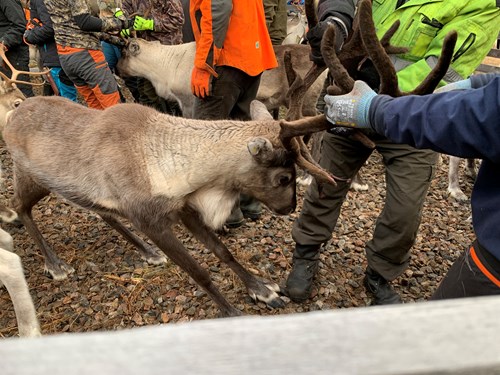Cara Ocobock, a professor and researcher at the University of Notre Dame in Indiana, United States, visited Dr. Minna Turunen and Dr. Päivi Soppela at the Arctic Centre, University of Lapland last October. Her visit was supported by the University of Lapland through the American Arctic Connection program of the US Embassy.
The group is collaborating with prof. Karl-Heinz Herzig and PhD student Ville Stenbäck at the University of Oulu on a research project: How cold climate adaptations may affect metabolic health variation among reindeer herders and office workers in Finland. In short, they are seeking to understand how reindeer herders manage the physical activity associated with herding in a cold Northern environment and how the herders compare to people working at more sedentary office jobs in climate-controlled spaces.

The research team met with the Reindeer Herders’ Association in Rovaniemi to learn from local herders. They also visited a local reindeer roundup, witnessing the social importance and physical demands of the event. In February 2023, the team worked with herders in Ivalo and Inari, northernmost Finland to collect data. The questions that they investigated are:
-
How does health differ between reindeer herders and office workers?
-
Do reindeer herders have a different metabolic profile from office workers due to their more frequent exposure to cold?
-
Does the frequency of cold exposure during childhood affect the activity of brown adipose tissue (BAT), a type of fat burned to keep warm, during adulthood?
-
In what ways do herders and office workers see climate change affecting their local environment and their jobs?
For more information about the recent data collection, Yle has published a video in Sámi.
For more information about the research efforts, Dr. Ocobock’s site showcases earlier findings and published reports.
